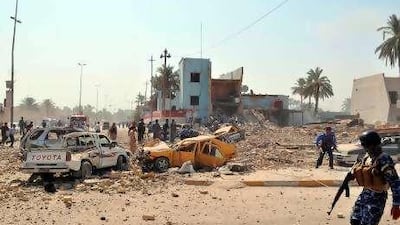BAGHDAD // Shiite gangs are joining the Sunni extremists of al Qa'eda to form new and dangerous alliances that threaten stability in southern Iraq, government officials and community leaders have warned. A series of deadly attacks last month in once secure areas, including the southern cities of Kut and Basra, caught the Iraqi authorities by surprise and, they say, indicate that al Qa'eda has made contacts with Shiite groups willing to carry out strikes in the region.
The cooperation, driven by a mixture of money, fear and a mutual hatred of Iran, represents a stark reversal. Since the formation of al Qa'eda in the late 1990s, the radical Sunni Muslim group and its affiliates have regularly targeted Shiites, whom they consider heretics. That hostility continued following the US-led invasion of Iraq in 2003 and the factional fighting that broke out soon thereafter.
There are signs, however, that this longstanding acrimony has given way to the desire of al Qa'eda sympathisers to penetrate Iraq's Shiite-dominated southern provinces. To that end, they have found willing Shiite allies, according to regional officials. "It is unfortunate but we understand that some Shia people are involved with and support the work of al Qa'eda," said Shamel Mansour Ayal, chairman of Wasit provincial council's security commission, which is headquartered in Kut.
Kut was spared insurgents' bombs after the 2003 invasion, but last month it was attacked twice, once in a strike that killed more than a dozen police officers and ignited fears that an al Qa'eda sleeper cell had been activated. That assault, on August 25, was part of a coordinated series of attacks in Kut, Basra and more than 10 other cities that killed more than 60 people, mainly security personnel.
"Some people in Wasit are cooperating with al Qa'eda, giving them information and allowing plans to go ahead," Mr Ayal said. He blamed the situation on growing links among criminal networks, willing to work for anyone as long as they are well paid. Another reason is the failure to form a government since parliamentary elections in March. "Al Qa'eda has success in recruiting people because of the political vacuum in Iraq which has made people lose confidence in the government and in politics. Now people are doing anything to make money. The criminal gangs in Wasit are also working with al Qa'eda."
Muhammad al Qasim, an independent security analyst, said Shiite criminal groups were acting as guns-for-hire to al Qa'eda, as part of a new strategy by the organisation. @Email:Al Qa'eda has been looking for alliances with other organisations so that it can carry out simultaneous attacks in many different places," he said. "Those alliances mean they are working with Shiite mercenaries and Baathists to conduct operations in the Shiite provinces.
"Sunni or Shiite, it doesn't matter to these groups, as long as there is money for them." Mullah Nazim Jubouri, a tribal leader from Duluyia in Salahaddin province, once fought with al Qa'eda before switching sides and joining the Awakening movement. He said Shiites were working in concert with Sunni extremists. "Al Qa'eda and these groups operate more for money than on a set of principles," he said. "A number of Shiite figures turned to work with al Qa'eda and ordinary Shiite citizens are too."
Some Shiite gangs, unconcerned by ideology, were happy to be subcontracted by al Qa'eda to carry out attacks, Mr Jubouri said. While money was the principal motive for many, other Shiite radicals had actually converted to an extremist form of Sunni Islam in secret, he said. "These people are part of the al Qa'eda sleeper cells that we have seen are operating now," he said. While it is impossible to verify such assertions, a Shiite cleric in Basra said separately that al Qa'eda has its "fingers deep inside the south", after winning over some Shiites by convincing them it was the only force capable of opposing spreading Iranian influence.
"The Shiites who side with al Qa'eda are afraid more than anything else that Iran will change the identity of Basra from an Arab city," said Jabber al Jabberi, imam at the al Hadari mosque. "They see the Iraqi government as an Iranian hand and so they help or support al Qa'eda as a way of preventing a takeover by Iran." Baghdad and Tehran fought a devastating eight-year war in the 1980s that the former Iraqi dictator Saddam Hussein called an Arab-Persian conflict. As a result, many Iraqis - Sunni and Shiite alike - are intensely anti-Iranian. Tehran's significant involvement in Iraqi affairs since 2003 has only heightened those feelings.
"Al Qa'eda has been quietly recruiting down here for the past two years," Mr al Jabberi said. "They found many poor people with nothing to eat except dust while government officials have been playing with billions of dollars. Under those circumstances, of course al Qa'eda has been successful." Al Qa'eda was expanding its area of operation and had found accomplices enabling it to make attacks in previously safe zones in the Shiite dominated south, said Maj Gen Mohammed al Askari, a spokesman for Iraq's ministry of defence.
"The environment in southern Iraq is not as good for al Qa'eda as it is in other cities, but there are those who cooperate with them, togive them information and assistance just to get money," he said. However, authorities believed those carrying out the bombings in places such as Kut, Basra and Kerbala were not local al Qa'eda militants but had traveled from traditional Sunni militant strongholds, Maj Gen al Askari said.
"There are al Qa'eda sleeper cells but they are moving people from areas such as Diyala, Mosul or Anbar to Wasit, Basra and Maysan," he said. "They want to open up another front and create the image that all of Iraq is insecure. Their operations coincided with the arrival of foreign companies wanting to invest in those areas." nlatif@thenational.ae

